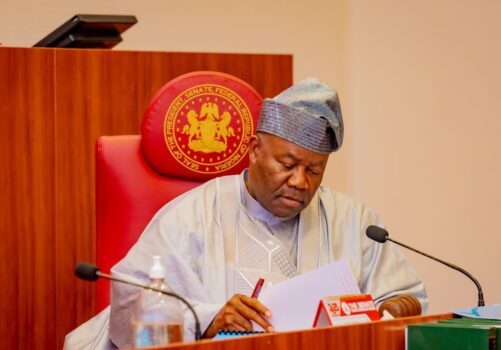 The Senate on Thursday passed for second reading four tax reform bills proposed by President Bola Tinubu in October 2024, following extensive debate among lawmakers.
The Senate on Thursday passed for second reading four tax reform bills proposed by President Bola Tinubu in October 2024, following extensive debate among lawmakers.
The bills, designed to overhaul Nigeria’s tax system, were referred to the Committee on Finance for further scrutiny. The committee was instructed to report back within six weeks.
Senate Leader Opeyemi Bamidele (APC, Ekiti Central) led the debate, highlighting the bills’ significance in simplifying the tax landscape, reducing burdens on small businesses, and streamlining tax collection.
The proposed bills include:
- Nigeria Tax Bill 2024: Establishing a fiscal framework for taxation.
- Tax Administration Bill: Providing a legal framework for tax operations and dispute resolution.
- Nigeria Revenue Service Establishment Bill: Replacing the Federal Inland Revenue Service with the Nigeria Revenue Service.
- Joint Revenue Board Establishment Bill: Creating a tax tribunal and ombudsman for tax matters.
Bamidele emphasized targeted benefits, including tax exemptions for those earning minimum wage or less, relief for small businesses with annual turnovers below ₦50 million, and a phased reduction in corporate income tax from 30% to 25% by 2026.
“The reforms aim to ensure uniformity in tax revenue administration, eliminate double taxation, encourage private sector investments, and increase disposable incomes,” Bamidele stated.
While lawmakers like Senators Sani Musa (APC, Niger East), Seriake Dickson (PDP, Bayelsa West), and Tahir Monguno (APC, Borno North) expressed support, Senator Ali Ndume (APC, Borno South) voiced reservations. He called for further consultations, citing concerns over timing and issues with derivation and VAT.
Senate President Godswill Akpabio put the bills to a voice vote, with the majority supporting their progression. The session concluded with Akpabio affirming the “Ayes” with his gavel.

INEC Rejects Petition To Recall Senator Natasha Akpoti-Uduaghan
President Tinubu Set To Depart For Two-Week Working Visit To Paris
Tinubu Reconstitutes NNPC Board, Appoints New Leadership
DSS Arrests Two Key Suspects In Edo Traveller Killings